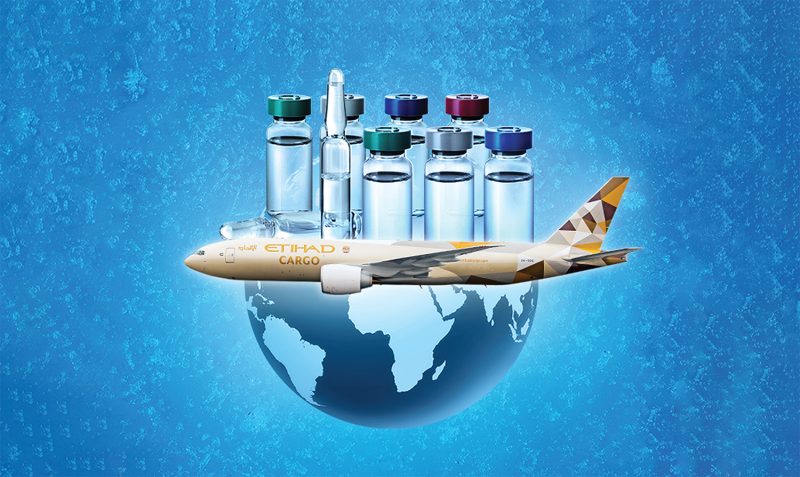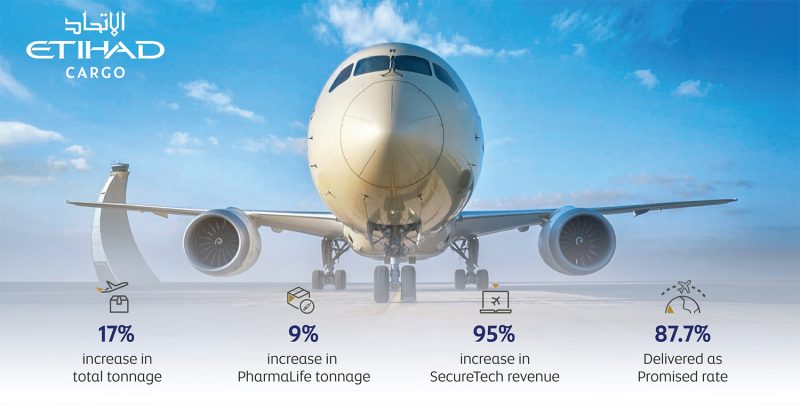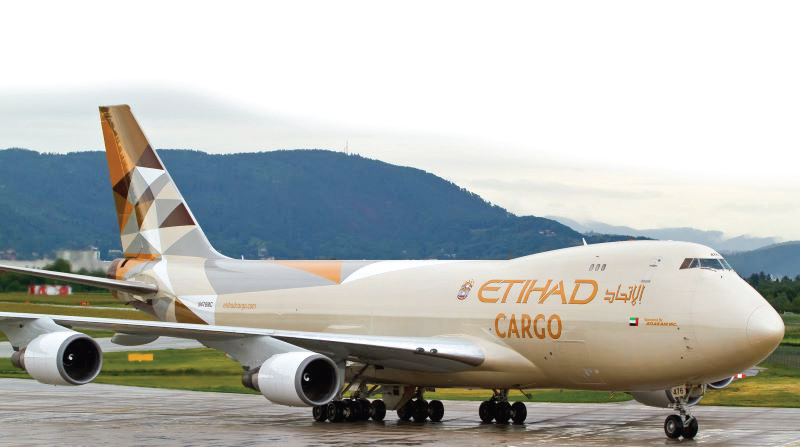Etihad Cargo Leans on IoT and other smart technologies to minimize losses, boost pharma-transport efficiency
The Abu Dhabi-based cargo carrier achieves a 99.7% pharma compliance rate to reduce losses, ensuring safe delivery of pharma products. It’s hub in the UAE capital has unique tunnel that connects passenger terminal to cargo terminal, reducing transit time to as little as 30 minutes. Tunnel also provides protection from external elements such as heat and sunlight, crucial for maintaining the integrity of pharma and perishable products.
By R. Chandrakanth
The COVID-19 pandemic was indeed a Black Swan event which left millions of lives shattered and economies destroyed. The magnitude of the disruption was humongous. No sector was spared. With supply chain disruption, global trade almost came to a standstill. But two sectors – pharmaceuticals and logistics – standout in reinventing themselves during those trying times.
The learnings from that time have come good. It’s almost four years since the pandemic and we see both the pharmaceutical sector and the logistics industry (air cargo, in particular) having evolved, in an accelerated mode.
It is not that the challenges have disappeared. There are always fresh ones that crop up, testing the stakeholders in the entire value system and there are logistics players who are well ahead of the curve, having understood what the challenges are.
Etihad Cargo is one of them. Its special products, PharmaLife in particular, is exceptional as the airline takes the transportation of pharmaceuticals very seriously. It was the first carrier in the Middle East to be awarded IATA’s Center of Excellence for Independent Validators (CEIV) certification in Pharmaceutical Logistics. Using specially-designed, temperature-controlled equipment, Etihad ships pharmaceuticals in the quickest possible time, adhering to the highest compliance guidelines.
But the pharma-air cargo linkages are not without challenges, sometimes impacting exports. The Manager of Global Cool Chain Products, Etihad Cargo, Fabrice Panza, states that Pharma-air cargo faces challenges primarily due to the high value and time- and temperature-sensitive nature of pharmaceutical products.
Different types of pharma goods, including active pharmaceutical ingredients (APIs), medical devices, and vaccines, each have distinct requirements, necessitating customized solutions involving specialized packaging, such as passive, hybrid, and active containers, to ensure consistent temperature control.
“The industry has shifted over the past decade, with a growing need for shipments to be maintained at 15-25°C, now accounting for about 60-70% of Etihad Cargo’s shipments, compared to the 2-8°C range that dominated in the past. Etihad Cargo addresses these evolving demands with its young fleet, equipped with temperature-controlled technology capable of accommodating both temperature ranges on the same aircraft. Additionally, we collaborate with compliant ground handling agents and employ cool dollies for tarmac transfers, ensuring seamless temperature regulation and safeguarding the integrity of pharmaceutical exports,” Panza explains.
One of the biggest challenges for the pharma-air cargo players has been how to minimize pharma losses due to mishandling/improper equipment or storage. As per statistics, the losses are said to be as high as $35 billion, considering all modes of transport, air cargo being among the top.
Panza notes, “IATA statistics show that around 40-50% of vaccines are wasted, not only during air transportation but also in the first and last mile, where mishandling, improper equipment, and storage are common causes of loss. To address these blind spots, Etihad Cargo is committed to ensuring product integrity, demonstrated by our achievement of IATA CEIV Pharma certification, which involves breaking down and scrutinizing each step of the air cargo process. This certification helps make transportation fully transparent and controlled, reducing risks throughout the supply chain. By leveraging IoT technology for real-time monitoring and maintaining short lead times, Etihad Cargo minimizes temperature deviations and other vulnerabilities, achieving a 99.7% pharma compliance rate to reduce losses and ensure the safe delivery of pharmaceutical products.”
Etihad Cargo’s ‘PharmaLife’ pprioritizes ground handling and loading; ensures 60 minutes between the aircraft and the cooling facility, subject to local service level agreements; Temperature-controlled storage and cargo hold temperature devices in the aircraft; Dedicated pharmaceuticals customer service team working 24/7; Pre-cooled thermo blanket protection to and from the aircraft; Trained and experienced ground handling; and 22 Qualified Envirotainer Provider (QEP) stations and Global Master Lease Agreement with Envirotainer, CSafe Global, Dokasch, Va-Q-Tec and Skycell.
To further understand how Etihad addresses these challenges, Fabrice Panza, the Manager of Global Cool Chain Products, Etihad Cargo, gives insights in this interview, excerpts of which are below:
The weakest link in the air pharma supply chain is said to be ‘airport on-tarmac pharma transportation’, what is your take on that?
Any moment outside a temperature-controlled environment introduces risk. This is true at the airport, as well as during the first and last mile, where each handover point – with 15 to 25 such handover points from origin to destination – presents a potential vulnerability. At Etihad Cargo, we treat these Critical Control Points (CCPs) with utmost importance, implementing specific processes and mitigation measures to safeguard product integrity.
At our Abu Dhabi hub, we’ve strengthened this traditionally weak link by using state-of-the-art cool dollies to maintain temperature control during on-tarmac handling. Coupled with robust Standard Operating Procedures (SOPs) and proactive shipment tracking, we ensure each pharma shipment is meticulously managed. Additionally, thermal covers are available for extra protection, further bolstering on-tarmac transportation and converting it from a weak point to a strong link in the supply chain.
What is the adoption rate of digital technologies in air pharma supply chain? What benefits do you see in deploying digital technologies?
The adoption rate of digital technologies in the air pharma supply chain is growing rapidly, although it still has room for improvement. The pace has accelerated due to the widespread integration of IoT, not only in active and hybrid containers but also in smart packaging. While challenges remain, such as ensuring these technologies do not interfere with airline communication equipment, qualified solutions are increasingly providing end-to-end visibility. The key benefit of deploying digital technologies is improved data connectivity, enabling seamless integration of stakeholders—airlines, ground handlers, and freight forwarders—through APIs.
Unlike in the past, where data was passive and collected manually, real-time monitoring now allows for immediate issue detection and response, enhancing the speed and reliability of operations. Moreover, technologies like blockchain ensure data integrity, while AI-powered predictive management offers better quality forecasting and operational control. This results in leaner processes, reduced lead times, and increased sustainability by optimizing energy use and minimizing waste across the supply chain.
What three tech trends do you think can help enhance the air pharma supply chain?
The top three tech trends that can enhance the air pharma supply chain are Virtual Reality (VR) and Augmented Reality (AR), Artificial Intelligence (AI), and IoT-enabled robotics. VR and AR technologies can significantly improve handling accuracy by providing visual guidance for labelling and storage, reducing errors during the process. AI enhances predictive management, allowing for better forecasting and real-time decision-making to maintain product integrity. IoT-enabled robotics can automate repetitive tasks and provide seamless monitoring, ensuring precise temperature control and swift issue resolution. Together, these technologies streamline operations, enhance accuracy, and optimize the efficiency of the air pharma supply chain.
Tell us how important it is for Etihad – training/certification programs to enhance the air pharma supply chain at Etihad’s facility?
Training and certification programs, such as IATA CEIV Pharma, are essential to enhancing the air pharma supply chain at Etihad Cargo. While infrastructure, SOPs, and technology are crucial, the most critical element is the human factor—ensuring that everyone involved in handling pharma shipments is equipped with the right skills and awareness. Constant training helps establish a robust Quality Management System (QMS) that integrates sales, operations, and quality, providing not just the “how” but also the “why” behind procedures. This understanding is vital, as it instils a sense of purpose in our team, driving them to uphold the highest standards for the safe transport of pharmaceutical products. At Etihad Cargo, our PharmaLife program reflects this commitment, as we actively contribute to saving lives through meticulous training and adherence to best practices.
Which are the best airports in the world for pharmaceutical/cold chain logistics?
Zayed International Airport in Abu Dhabi stands out as one of the best airports in the world for pharmaceutical and cold chain logistics, thanks to its recent investments in a dedicated pharma hub that is fully IATA CEIV Pharma certified. Etihad Cargo’s Abu Dhabi hub features state-of-the-art cool dollies and a unique tunnel connecting the passenger terminal to the cargo terminal, which significantly enhances efficiency. This tunnel not only reduces transit time to as little as 30 minutes but also ensures shipments are shielded from external elements such as heat and sunlight, crucial for maintaining the integrity of pharmaceutical and perishable products.
What do you think of Pharma.Aero and your suggestions to help improve air pharma supply chain?
Pharma.Aero is a highly successful and respected community platform that has quickly established itself as the leading association for pharmaceutical logistics within a decade. Etihad Cargo has supported Pharma.Aero’s mission to share knowledge and improve industry standards since the beginning, co-founding the first Pharma Logistics Masterclass in Antwerp in 2021 during the pandemic, followed by the second in Abu Dhabi in 2022. The masterclass has since become an annual success, with increasing participation each year, demonstrating Pharma.Aero’s deep understanding of the industry’s needs. As I often say, if you implement just 10% of the insights gained from Pharma.Aero and its Pharma Logistics Masterclass, your organization will see remarkable improvements.












